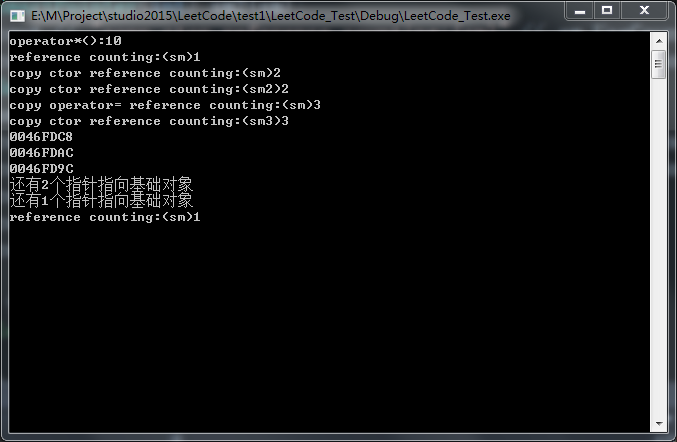1. 引用计数
https://www.cnblogs.com/QG-whz/p/4777312.html
2. C++赋值运算符为什么要返回引用?
https://blog.csdn.net/pinganaini/article/details/50807513
https://blog.csdn.net/realdinghao/article/details/19899383
3.C++本质:“=”运算符的重载,深拷贝 浅拷贝
http://www.cnblogs.com/alexusli/archive/2008/08/27/1277683.html
https://www.cnblogs.com/Winston/archive/2008/06/03/1212700.html
4. C++拷贝构造函数和赋值运算符
https://www.cnblogs.com/wangguchangqing/p/6141743.html
5. 智能指针的实现
https://blog.csdn.net/qq_29003347/article/details/78495683
https://blog.csdn.net/worldwindjp/article/details/18843087
https://www.cnblogs.com/wxquare/p/4759020.html
https://blog.csdn.net/to_be_better/article/details/53570910
简单剖析:
https://www.cnblogs.com/lanxuezaipiao/p/4132096.html
https://www.jianshu.com/p/0300b2d833af
比较:
https://blog.csdn.net/skyroben/article/details/70195575
6. 实现代码(me)
#define M_share_ptr #ifdef M_share_ptr #include<memory> #include<iostream> #include<assert.h> using namespace std; template<typename T> class SmartPointer { public: //构造函数 SmartPointer(T* ptr = nullptr) :m_ptr(ptr) { if (ptr) { m_count = new size_t(1); } else { m_count = new size_t(0); } } //拷贝构造函数 //拷贝构造函数必须以引用的方式传递参数。 //这是因为,在值传递的方式传递给一个函数的时候, //会调用拷贝构造函数生成函数的实参。如果拷贝构造函数的参数 //仍然是以值的方式,就会无限循环的调用下去,直到函数的栈溢出。 SmartPointer(const SmartPointer& src) { if (this != &src) { this->m_ptr = src.m_ptr; this->m_count = src.m_count; (*this->m_count)++;//"->"的优先级高于"*" } } //拷贝赋值函数,重载operator= //会不会有连续赋值?只有返回一个引用,才可以循序连续赋值 //返回值也可以支持连续赋值,会增加拷贝代价 SmartPointer& operator=(const SmartPointer& src) { if (m_ptr == src.m_ptr) return *this; ReleaseCount();//如果为0,内存已经释放,后面的赋值怎么解释呢? m_ptr = src.m_ptr;//好像有点明白了. m_count = src.m_count; (*m_count)++; return *this; } //重载操作符 T& operator*() { if (m_ptr) return *m_ptr; //throw exception } T* operator->() { if (m_ptr) return m_ptr; //throw exception } //析构函数 ~SmartPointer() { (*m_count)--; if ((*m_count) == 0) { delete m_ptr; delete m_count; } else { cout << "还有" << *m_count << "个指针指向基础对象" << endl; } } size_t UseCount() const { return *m_count; } private: T* m_ptr; size_t* m_count;//引用计数 void ReleaseCount() { (*m_count)--; if ((*m_count) == 0) { delete m_ptr; delete m_count; } } }; int main() { SmartPointer<int> sm(new int(10)); int test = 1; if (1 == test) { cout << "operator*():" << *sm << endl; cout << "reference counting:(sm)" << sm.UseCount() << endl; SmartPointer<int> sm2(sm); cout << "copy ctor reference counting:(sm)" << sm.UseCount() << endl; cout << "copy ctor reference counting:(sm2)" << sm2.UseCount() << endl; SmartPointer<int> sm3; sm3 = sm; cout << "copy operator= reference counting:(sm)" << sm.UseCount() << endl; cout << "copy ctor reference counting:(sm3)" << sm3.UseCount() << endl; cout << &sm << endl; cout << &sm2 << endl; cout << &sm3 << endl; } cout << "reference counting:(sm)" << sm.UseCount() << endl; //delete sm; getchar(); return 0; } #endif/*M_share_ptr*/
运行结果:



